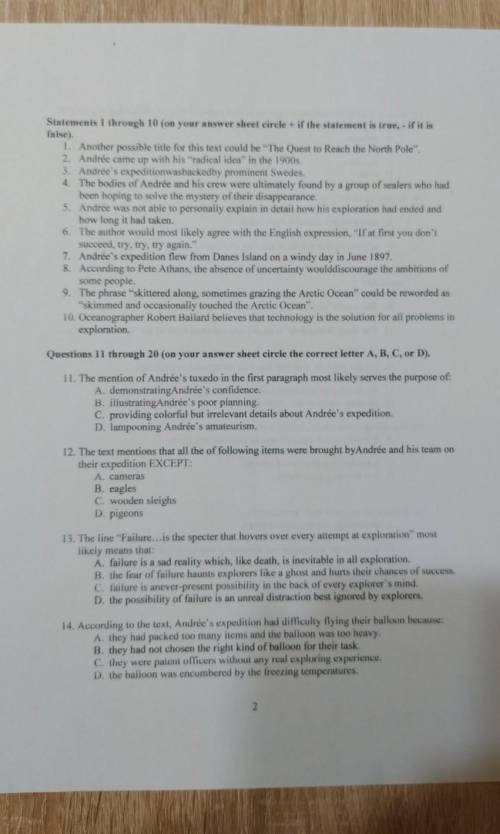буду очень благодарна ❤️ At the end of the 19th century a middle-aged Swedish , a patent officer captivated by the promise and possibilities of technology, came up with a radical idea: Why not fly in a hydrogen bailoon to become the first to discover the North Pole, a piace that at that time was as mysterious and unknown as Mars? For years explorers had atternpted to reach the Pole overland; many died trying. An air expedition, Salomon August Andrée reasoned, would climinate much of the risk. And so, on a windy day in July 1897, with support from Aifred Nobei and Sweden's king, Andrée and two younger colleagues climbed into the basket of a 67-foot- diameter balloon on Danes Island in the Svalbard archipelago. The team packed wooden sledges, tood for several months, carrier pigeons to reiay messages, even a tuxedo Andrée hoped to wear at the end of the journey. As journalists and well-wishers cheered and waved, they soared into the air, aiming to flont to a place no human had seen. As soon as they lifted off, wind battered the balloon. Fog froze on it, weighing it down. For 65 and a half hours the Eagle skittered along, sometimes grazing the Arctic Ocean. Thirty- three years later, sealers stumbled across the frozen corpses of Andrée and his crew-along with their cameras and diaries, which revealed that they'd been forced to land on pack ice 298 miles from the North Pole. The three had perished during a grueling three-month trek south. Failure-never sought, aiways dreaded, impossible to ignore-is the specter that hovers over every attempt at exploration. Yet without the sting of failure to spur us to reassess and rethink, progress would be impossible. Today there is growing recognition of the importance of failure. Educators ponder how to make kids more comfortable with it. Business schools teach its lessons. Psychoiogists study how we cope with it, usuaiiy with an eye toward improving the chance of success, Indeed, the very word "success" is derived from the Latin succedere, "to come after"-and what it comes after, yes, is failure . One cannot exist without the other. Oceanographer Robert Ballard, a veteran of 130 undersea expeditions and discoverer of the Titanic, calls this interplay the yin yang of success and failure. Andrée's halloon expedition was cutting-edge for its day, and fail it did, but "you don't know untii you try in aviation," a historian of science at Norway's University of Tromsa, points out. Improved technology ultimately helped solve the problems of Arctic aviation and has opened countless other doors. But even Baliard, whose major discoveries were aided by robots, notes that technoiogy "doesn't make everything possibie." And that's a good thing. "If you take away uncertainty, you take away motivation," says mountain climber Pete Athans. "Wanting to excced your grasp is the nature of the human condition. There's no magic to getting where we aiready know we can get."

Ответы
Показать ответы (3)
Другие вопросы по теме Английский язык
Популярные вопросы
- Отметь ряд в котором есть несклоняемое существительное 1)печь, рубль,...
2 - Изобразите на координатной плоскости множество решений неравенства x^2+2x+y^2-4y+1...
3 - 6. соотнесенность словосочетаний по характеру синтаксической связи между...
1 - Вцистерну входит 96 ведер воды сначала ей налили наполовину потом добавили...
1 - Почему вес тела, движущегося с ускорением, направленным вертикально,...
2 - Переведите текст once there lived an old man and an old woman, his wife....
3 - Примеры иллюстрирующие важную роль рецепторов пальцев в той или иной...
2 - 8-9 класс и перевод есть вставьте подходящие ! task 3. fill in the gaps...
3 - Для интенсивного роста не характерно а) увеличение численности занятых...
2 - 5. синтаксические единицы представлены в ряду а) словосочетание, предложение...
3